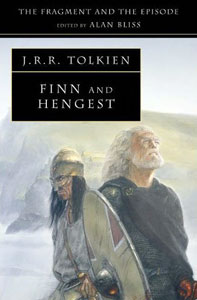Related Research Articles
Year 876 (DCCCLXXVI) was a leap year starting on Sunday of the Julian calendar.

Year 934 (CMXXXIV) was a common year starting on Wednesday of the Julian calendar.

Finn and Hengest is a study by J. R. R. Tolkien, edited by Alan Bliss and published posthumously in book form in 1982.

Franeker is one of the eleven historical cities of Friesland and capital of the municipality of Waadhoeke. It is located north of the Van Harinxmakanaal and about 20 km west of Leeuwarden. As of 2023, it had 13,015 inhabitants. World Heritage Site the Eise Eisinga Planetarium, established in 1781, is located in the city.

Haakon Ericsson was the last Earl of Lade and governor of Norway from 1012 to 1015 and again from 1028 to 1029 as a vassal under Danish King Knut the Great.
Harald 'Klak' Halfdansson was a king in Jutland around 812–814 and again from 819–827.
Hessel Miedema was a leading Dutch art historian and the world authority on Karel van Mander.
Sikke Sjaardema, alternatively spelled Sikko or Sicka, was the eighth potestaat of Friesland, a province of the Netherlands. The potestaat was the elected provincial ruler.
Adelbrik Adelen was the third potestaat of Friesland a province of the Netherlands.
Hessel Martena was the tenth Potestaat of Frisia. He succeeded Reinier Camminga.

Magnus Forteman was the legendary first potestaat and commander of Frisia which is now part of Germany and the Netherlands. His existence is based on a saga's writings.
Reinier Camminga was the ninth potestaat or governor of Friesland now a province of the Netherlands.
Igo Galama was the legendary fifth potestaat of Friesland, now a province of the Netherlands. There is no evidence that he existed.
Rodulf Haraldsson, sometimes Rudolf, from Old Norse Hróðulfr, was a Viking leader who raided the British Isles, West Francia, Frisia, and Lotharingia in the 860s and 870s. He was a son of Harald the Younger and thus a nephew of Rorik of Dorestad, and a relative of both Harald Klak and Godfrid Haraldsson, but he was "the black sheep of the family". He was baptised, but under what circumstances is unknown. His career is obscure, but similar accounts are found in the three major series of Reichsannalen from the period: the Annales Bertiniani from West Francia, the Annales Fuldenses from East Francia, and the Annales Xantenses from Middle Francia. He died in an unsuccessful attempt to impose a danegeld on the locals of the Ostergo.

The Battle of Finnsburg was a conflict in the Germanic heroic age between Frisians with a possible Jutish contingent, and a primarily Danish party. Described only in later Anglo-Saxon poetry, if the conflict had an historical basis it most likely occurred around 450 AD.
Abdagus was, according to 18th and 19th century historical books, a duke of Frisia.
The "Finnesburg Fragment" is a portion of an Old English heroic poem in alliterative verse about a fight in which Hnæf and his 60 retainers are besieged at "Finn's fort" and attempt to hold off their attackers. The surviving text is tantalisingly brief and allusive, but comparison with other references in Old English poetry, notably Beowulf, suggests that it deals with a conflict between Danes and Frisians in Migration-Age Frisia.
Potestaat was the supposed title of a governor of medieval Friesland. According to the legendary Karelsprivilege, a 14th-century forgery, Charlemagne had first granted the title of potestaat to Magnus Forteman. He and most of his early successors were entirely fictional, invented later by pseudohistorians in order to argue in favour of the notion of Frisian freedom. The title potestaat does not appear in historical documents until 1470. It became popular after 1578, when the idea of the inherited office of potentate was linked to the new office of stadtholder, which was held by the House of Nassau-Dietz.